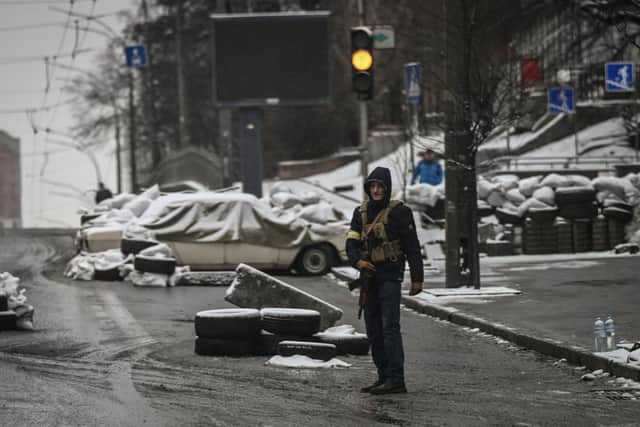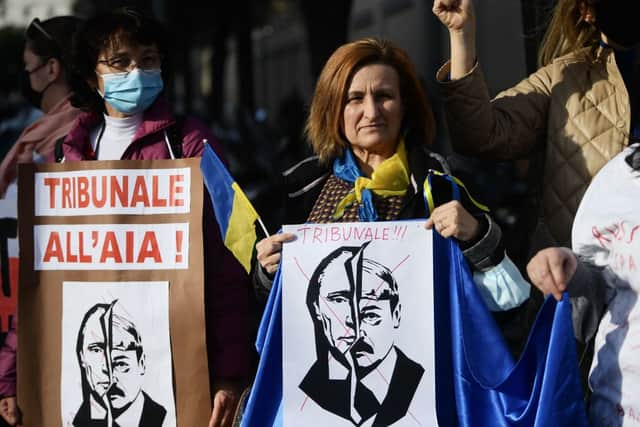What is the International Criminal Court? Powers explained - and could Putin go to court for war crimes?
This article contains affiliate links. We may earn a small commission on items purchased through this article, but that does not affect our editorial judgement.
and live on Freeview channel 276
A war crimes investigation has begun after Boris Johnson accused Vladimir Putin of committing atrocities by bombarding cities in his invasion of Ukraine.
The International Criminal Court (ICC) opened an investigation on Wednesday (2 March) night after Britain and 37 allies referred Russia over what the Prime Minister described as “abhorrent” attacks.
It is the largest ever referral to the ICC.
Advertisement
Hide AdAdvertisement
Hide AdICC prosecutor Karim Khan said work would begin “immediately”, with his team already collecting evidence, after the coordinated referral freed him to get to work without the need for judicial approval.
But what power does the ICC have over Putin? Can it bring him in for questioning? Or further still, trial?
Here is everything you need to know about it.
What is the ICC?
The International Criminal Court is an intergovernmental organisation that investigates and punishes people for genocide, crimes against humanity and war crimes.
It was created in 2002, and its main office is in The Hague in the Netherlands.
Advertisement
Hide AdAdvertisement
Hide AdIt also has smaller offices in New York City, Uganda, the Democratic Republic of the Congo, Chad, and the Central African Republic.
There are 123 member states of the ICC. Nearly all the countries in Europe and South America are members, while only about half the countries in Africa are members.
Only a handful of Asian countries have joined; notable absentees from the ICC membership include Russia, the US, China, and India.


Why has an investigation been launched?
For the first time, the UK has explicitly accused Putin of war crimes, with Downing Street claiming “horrific acts” were occurring on an almost hourly basis as population centres are targeted.
Advertisement
Hide AdAdvertisement
Hide AdStrikes that damaged the Babi Yar Holocaust memorial in Kyiv and the central square in Kharkiv have caused revulsion, and Western allies fear it is a sign of a shift in Russian tactics further towards the indiscriminate targeting of urban areas.
More than 2,000 civilians have died since the invasion began, Ukraine’s state emergency service said, although that figure has not been independently verified.
On Monday (28 February), ICC prosecutor Karim Khan said he planned to open an investigation into events in Ukraine “as rapidly as possible”, but the referral from the 38 nations also including Ireland, Germany and Spain allowed him to launch “active investigations”.
They will look for possible war crimes, crimes against humanity or genocide committed by any person on the territory of Ukraine.
Advertisement
Hide AdAdvertisement
Hide AdJustice Secretary Dominic Raab, a former lawyer who has prosecuted war crimes, said the UK will assist the ICC in hunting down suspected Russian war criminals.
The deputy prime minister told The Daily Telegraph that Britain could house Russian commanders suspected of atrocities in its prisons – in addition to proving a safe haven for witnesses who testified against them.
What is a war crime?


War crimes are defined by the UN and developed at the Geneva Conventions - which are four treaties and three additional protocols that establish international legal standards for humanitarian treatment in war.
The 1949 Geneva Convention, negotiated after the Second World War, defines the basic rights of wartime prisoners.
Advertisement
Hide AdAdvertisement
Hide AdIt also establishes protections for people who are wounded and for civilians in and around a war zone.
The definition of war crimes itself is long, including details of types of weaponry that are banned, to the targeting of certain buildings, such as hospitals and those dedicated to religion, education, art, science or charitable purposes.
It bans actions that cause deliberate suffering, such as torture, as well as “intentionally directing attacks against the civilian population as such or against individual civilians not taking direct part in hostilities”.
White House Press Secretary Jen Psaki has said she had seen reports that Russia had used therombaric “vacuum” bombs, but could not confirm it was the case.
Advertisement
Hide AdAdvertisement
Hide Ad“If that were true, it would potentially be a war crime,” she told a press briefing.
What power does the ICC hold?
The ICC does not have global jurisdiction, and instead can only investigate and prosecute crimes committed within member states. and crimes committed by nationals of member states.
Since neither Russia (which left the ICC in 2016 after a report classified the 2014 annexation of Crimea as an “occupation”) nor Ukraine is a member state of the ICC, things get a bit more complicated.
However, Ukraine has previously accepted the ICC’s jurisdiction twice, doing so “on an open-ended basis” in the latter instance, which gives the ICC jurisdiction over Ukraine.
Advertisement
Hide AdAdvertisement
Hide AdYou would think proof of Russia’s war crimes (the definition of which includes invasion of another state and the bombardment and blockade of ports) would be easy to come by - just turn on the news.
But since Russia is not an ICC member, Russian individuals cannot be prosecuted for the offence.
Could Putin stand trial?
Boris Johnson has warned the Russian president he “cannot commit these horrific acts with impunity”, but if the ICC finds reasonable grounds to arrest Putin, it would have a hard time doing so.
Proving that leaders are directly responsible for the actions of their troops in the theatre of war, and that certain orders came directly from them, is harder to do than it would seem.
Advertisement
Hide AdAdvertisement
Hide AdSome experts think it would be easier to charge for the crime of aggression, which is “the planning, initiation, or execution of a large-scale and serious act of aggression using state military force.”
But even then, were Putin to be charged, he would have to be arrested in a country which accepts the ICC’s jurisdiction - which Russia does not.
To even stand a chance of having Putin stand trial, Russia would have to “lose” its conflict with Ukraine, have Putin ousted and replaced by a new government, who would then have to extradite him to a country or state under the ICC’s jurisdiction.
It’s possible, but there are a lot of unlikely steps to get to that point.
Advertisement
Hide AdAdvertisement
Hide AdInstead, it’s more likely that a charge could be filed against Putin on a much more symbolic level, much like the UN’s recent demand that Russia immediately stops using force against Ukraine.
A message from the editor:
Thank you for reading. NationalWorld is a new national news brand, produced by a team of journalists, editors, video producers and designers who live and work across the UK. Find out more about who’s who in the team, and our editorial values. We want to start a community among our readers, so please follow us on Facebook, Twitter and Instagram, and keep the conversation going. You can also sign up to our newsletters and get a curated selection of our best reads to your inbox every day.
Comment Guidelines
National World encourages reader discussion on our stories. User feedback, insights and back-and-forth exchanges add a rich layer of context to reporting. Please review our Community Guidelines before commenting.
